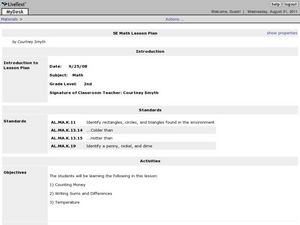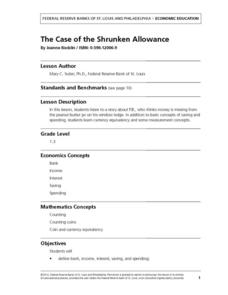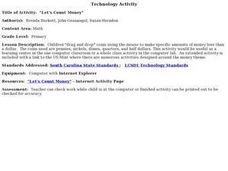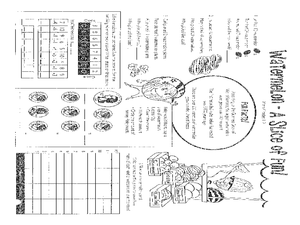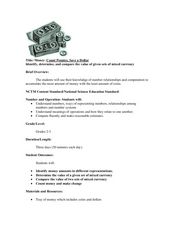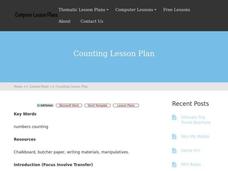Curated OER
Barter vs. Money
First graders listen to the book, Sheep in a Shop, that leads them to think about making financial decisions, trading, and the barter system. After the book is read aloud, a discussion ensues about some of the things that the sheep...
Curated OER
Estimating and Counting Money
Students explore the concepts of estimating and rounding. In this estimating and rounding instructional activity, students play a game of tic-tac-toe. Students pick items and must estimate their cost by rounding. Students estimate the...
Curated OER
Stamping Coins
Learners demonstrate that they can use a variety of coin combinations to make a single amount. They study all the ways to make 50 cents using coins using different coins.
Curated OER
Comparing Values: Comparisons Between Musical Notation and Money
Students identify ways in which the principles and subject matter of other disciplines taught in school, specifically math, are interrelated with those of music.
Curated OER
Counting Money Activity
Second graders explore commerce by practicing monetary transactions. In this consumer math lesson, 2nd graders practice using math functions to add and subtract different amounts of money. Students identify the different monetary units...
Curated OER
Count On It!
Students practice counting money. In this consumer math lesson, students identify the various U.S. coins and group them in various ways to equal a dollar. Students will use the money they collected for a donation towards a non-profit...
Federal Reserve Bank
The Case of the Shrunken Allowance
An allowance is an important thing! Make sure your kids know how to save and spend their own money. Using the book The Case of the Shrunken Allowance as a starting point, this plan covers income, spending and saving, counting, and more.
Federal Reserve Bank
Bunny Money
Teach your class about saving, spending, and goal setting with a story about a couple of bunnies who went shopping and related activities. Learners keep track of the bunnies' spending, practice identifying long- and short-term savings...
Curated OER
Adding and Subtracting Money
Students investigate U.S. currency by pretending to buy food. In this money lesson, students discover the vocabulary and value for each U.S. coin, then add the amounts in dollars and cents of food items they wish to purchase. Students...
Curated OER
"Let's Count Money"
Students participate in an interactive Internet activity that allows them to practice counting money. Students can work independently or cooperatively as they "drag and drop" coins using a mouse.
Curated OER
Counting Coins
Second graders explore the American monetary system by utilizing different denominations. In this currency lesson plan, 2nd graders participate in a die rolling activity in which they collect coins based on the rolled number. Students...
Curated OER
Shopping
Young scholars demonstrate how to count money through a simulated shopping experience. In this consumer math lesson, students read the book Just Shopping With Mom and count play money to illustrate how much the items in the book cost.
Curated OER
Combining Coins to Make Equal Monetary Amounts
Third graders determine how to make equivalent amounts of money using different sets of coins. In this money lesson, 3rd graders review money vocabulary and coin values before determining how to count bills and coins in different sets to...
Curated OER
Value Of Money
Students read the book "Alexander, Who Used To Be Rich Last Sunday," along with their teacher and take away coins as they follow along with the story. In this money and counting lesson plan, students get meaningful practice in the art of...
Curated OER
Watermelon - A Slice of Fun
In this multiple math skills about watermelons worksheet, young scholars solve most and least word problems, subtract to solve a cod and find the answer to a question, count coins, and graph types of watermelons. Students solve 28...
Curated OER
Money, Money, Honey Bunny!
Learners read a story about spending and saving money and talk about the difference between goods and services. In this money lesson plan, students also play a matching game to review the story and practice rhyming words from the story.
Curated OER
Money: Count Pennies, Save a Dollar
Students determine how to make the largest sum of money using the least amount of coins. In this mixed currency lesson, students listen to a reading of If You Made a Million by David M. Schwartz before participating in money counting...
Curated OER
Shopping for Candy
Students explore counting money. In this money counting and gingerbread house construction instructional activity, students use a calculator to determine how much and what type of candy they can buy given 25 cents. Students construct...
Curated OER
Piggy Bank Math
In this math worksheet, students learn to count coins to show a certain amount of money. Students are asked to use an indicated number of coins to total an amount. There are 8 problems. Students make a chart to solve each.
Curated OER
Money in Action
Learners become familiar with the various coins in our money system as well as amount of each coin. They help develop their ability to count change and find different ways to show equal amounts.
Curated OER
Counting Lesson Plan
In whole group practice, children count together and identify how many objects are drawn on butcher paper, increasing the number when they have achieved fluency. In pairs, they count manipulatives. They then copy series of numbers from...
Curated OER
Piggy Bank Math
Students practice solving money problems. In this counting coins lesson, students follow the outlined steps and use mixed operations to determine the coin combinations needed to solve a math word problem.
Curated OER
How Much Money?
Sixth graders count money. In this money lesson, 6th graders count sets of coins and dollar bills. During specified activities, they total orders and calculate the amont of change a customer should receive. Students take turns...
Curated OER
Money Makes the Fair-Go-Round
Young scholars explore the value of money. In this money lesson, students investigating combining amounts of money and making change. Young scholars count sets of money and make fair trades. Resources are provided.






